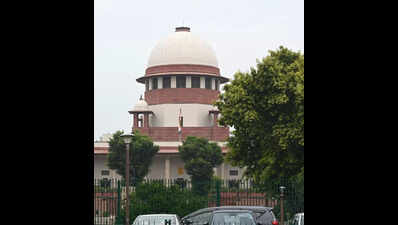Entertainment
Supreme Court Resumes Construction Projects, Exempts Environmental Clearance

The Supreme Court of India has reactivated stalled construction activities across various sectors, including housing, education, and industry. On February 28, 2023, the court ruled that projects with a built-up area between 20,000 and 150,000 square meters can proceed with approval from the state environmental authority, eliminating the need for clearance from the central government. This decision comes after a previous order on February 24, which had temporarily halted these projects due to concerns raised by the NGO Vanashakti about potential environmental damage.
The February 24 ruling had imposed an ex parte stay on a notification issued on January 29, which outlined new environmental clearance norms for construction projects. This action had significant consequences, leading to the suspension of thousands of projects nationwide, particularly affecting the educational and industrial sectors. The Supreme Court’s latest judgment emphasizes that while environmental protections are crucial, they should not impede necessary development.
A bench consisting of Chief Justice B. R. Gavai and Justice K. Vinod Chandran upheld the environment ministry’s notification and clarified that no central environmental approval is needed for the specified categories of construction. The court referenced statements made by Aishwarya Bhati, Additional Solicitor General, who noted that the central government lacks the capacity to conduct environmental scrutiny for projects in individual states.
While the Supreme Court supported the central notification, it also imposed limitations by requiring that industrial sheds, schools, colleges, universities, and hostels obtain clearance from the State Environment Impact Assessment Authority (SEIAA). The ruling effectively resolved ongoing ambiguities regarding which authority—state or central—should oversee projects in eco-sensitive zones and severely polluted areas.
Senior advocate Mukul Rohatgi, representing Godrej’s real estate division, argued that the exemption from requiring central approval for such projects has been in place since 2006. He asserted that the recent notification did not introduce any new regulatory concept. His views were echoed by senior advocate Atmaram Nadkarni, who represented CREDAI, the apex body for private real estate developers.
During the proceedings, Justice Gavai remarked, “No country can progress without development. The duty to protect the environment and ecology is paramount, but development activities cannot be stalled altogether.” This sentiment reflects the court’s balancing act between promoting economic growth and ensuring environmental safeguards.
The impact of the earlier injunction was significant, with Bhati informing the bench that the stay had led to the suspension of numerous construction projects across the country. In Maharashtra alone, there are over 700 pending applications awaiting clearance from the SEIAA.
The Supreme Court’s ruling marks a critical moment in India’s construction landscape, providing a pathway for thousands of projects to move forward while maintaining some level of environmental oversight at the state level.
-

 World5 months ago
World5 months agoSBI Announces QIP Floor Price at ₹811.05 Per Share
-

 Lifestyle5 months ago
Lifestyle5 months agoCept Unveils ₹3.1 Crore Urban Mobility Plan for Sustainable Growth
-

 Science4 months ago
Science4 months agoNew Blood Group Discovered in South Indian Woman at Rotary Centre
-

 World5 months ago
World5 months agoTorrential Rains Cause Flash Flooding in New York and New Jersey
-

 Top Stories5 months ago
Top Stories5 months agoKonkani Cultural Organisation to Host Pearl Jubilee in Abu Dhabi
-

 Sports4 months ago
Sports4 months agoBroad Advocates for Bowling Change Ahead of Final Test Against India
-

 Science5 months ago
Science5 months agoNothing Headphone 1 Review: A Bold Contender in Audio Design
-

 Top Stories5 months ago
Top Stories5 months agoAir India Crash Investigation Highlights Boeing Fuel Switch Concerns
-

 Business5 months ago
Business5 months agoIndian Stock Market Rebounds: Sensex and Nifty Rise After Four-Day Decline
-

 Sports4 months ago
Sports4 months agoCristian Totti Retires at 19: Pressure of Fame Takes Toll
-

 Politics5 months ago
Politics5 months agoAbandoned Doberman Finds New Home After Journey to Prague
-

 Top Stories5 months ago
Top Stories5 months agoPatna Bank Manager Abhishek Varun Found Dead in Well









